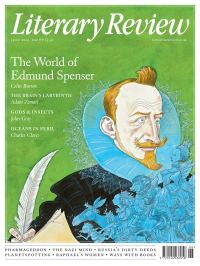James Kidd
Into the Heart of Darkness
The Lower River
By Paul Theroux
Hamish Hamilton 336pp £18.99
The Lower River, Paul Theroux’s twenty-seventh novel, is a story about a return. 62-year-old Ellis Hock travels to Malabo, a village in Malawi. Four decades earlier, he had chosen this tiny part of drought-ravaged Africa over conscription and the jungles of Vietnam.
The ageing Hock is moved by a different desire to escape: memories of building a school for the Sena tribe in Malabo provide a safe haven from a recent divorce and an ungrateful, money-grabbing daughter. ‘He was happy in the Lower River,’ Theroux states before upping the ante: ‘Supremely happy.’ Eventually, only a superlative will do: ‘The happiest days of his life.’ Readers need only attend to the nostalgia and the cliché to guess that Hock’s buoyancy will not last long.
The Lower River is not only a story about returns, but is itself a return. Theroux has a long association with Malawi. Like Hock, he grew up in Medford, Massachusetts, joined the Peace Corps in the early 1960s, and worked in Malawi where he helped establish a school. Accused of

Sign Up to our newsletter
Receive free articles, highlights from the archive, news, details of prizes, and much more.@Lit_Review
Follow Literary Review on Twitter
Twitter Feed
It wasn’t until 1825 that Pepys’s diary became available for the first time. How it was eventually decrypted and published is a story of subterfuge and duplicity.
Kate Loveman tells the tale.
Kate Loveman - Publishing Pepys
Kate Loveman: Publishing Pepys
literaryreview.co.uk
Arthur Christopher Benson was a pillar of the Edwardian establishment. He was supremely well connected. As his newly published diaries reveal, he was also riotously indiscreet.
Piers Brendon compares Benson’s journals to others from the 20th century.
Piers Brendon - Land of Dopes & Tories
Piers Brendon: Land of Dopes & Tories - The Benson Diaries: Selections from the Diary of Arthur Christopher Benson by Eamon Duffy & Ronald Hyam (edd)
literaryreview.co.uk
Of the siblings Gwen and Augustus John, it is Augustus who has commanded most attention from collectors and connoisseurs.
Was he really the finer artist, asks Tanya Harrod, or is it time Gwen emerged from her brother’s shadow?
Tanya Harrod - Cut from the Same Canvas
Tanya Harrod: Cut from the Same Canvas - Artists, Siblings, Visionaries: The Lives and Loves of Gwen and Augustus John by Judith Mackrell
literaryreview.co.uk